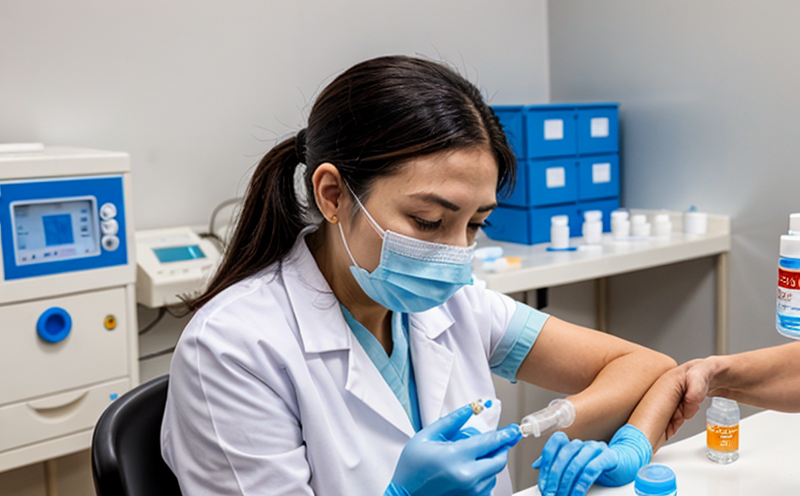JP Sterility Testing of Vaccines
The Japanese Pharmacopoeia (JP) is one of the most respected pharmaceutical standards globally. Compliance with JP guidelines ensures that pharmaceutical products meet strict quality and safety requirements, protecting public health. Among these stringent tests is sterility testing for vaccines. This procedure confirms the absence or presence of viable microorganisms within a vaccine preparation. The significance of this test lies in its role as an essential safeguard against contamination.
JP sterility testing typically involves inoculating a portion of the sample into a suitable culture medium and incubating it under controlled conditions to detect any microbial growth. If no growth is observed, the vaccine passes the test. However, ensuring accurate results requires sophisticated equipment like laminar flow hoods for handling samples, sterile media preparation, and an understanding of relevant standards such as JP 5.4.
The process begins with the collection of a representative sample from the batch. Prior to testing, the sample must be prepared by dilution or other means appropriate for the vaccine type. For instance, live attenuated vaccines may require different handling than inactivated ones due to potential live microbial content. It's crucial to follow precise protocols outlined in the Japanese Pharmacopoeia to ensure accurate results.
Once prepared, the sample is introduced into a sterile container or directly inoculated onto appropriate culture media. The chosen medium depends on the type of microorganism being tested for—common options include nutrient agar and thioglycollate broth for aerobic and anaerobic organisms respectively. Incubation times vary based on the expected incubation periods of different pathogens; typically, this ranges from 14 to 28 days.
Following incubation, any visible colonies or turbidity indicate microbial growth which would fail the sterility test. It's important to note that negative results do not guarantee complete freedom from contamination but provide strong evidence supporting a sterile product. Positive tests necessitate further investigation into potential sources of contamination and corrective actions if required.
Accurate testing requires adherence to strict procedures, including proper gowning protocols inside clean environments like laminar flow hoods, maintaining sterility throughout the process, and using validated methods as per the Japanese Pharmacopoeia. Regular calibration of equipment ensures consistent performance over time. Compliance with these stringent measures guarantees reliable test outcomes that contribute significantly towards ensuring safe vaccines for public use.
In conclusion, compliance with JP sterility testing is vital in maintaining high standards within pharmaceutical manufacturing processes. By adhering to rigorous procedures and utilizing appropriate technologies, laboratories can ensure the accuracy of their tests and provide valuable assurance regarding vaccine safety.
Benefits
Complying with JP sterility testing brings numerous advantages to pharmaceutical manufacturers:
- Enhanced Public Health Protection: Ensuring vaccines meet stringent quality standards helps protect public health by minimizing risks associated with contaminated products.
- Rigorous Compliance: Meeting Japanese Pharmacopoeia requirements demonstrates a commitment to international best practices, enhancing brand reputation and trustworthiness among consumers.
- Legal Assurance: Adherence to these standards provides legal protection against product liability claims due to defective vaccines.
- Enhanced Reputation: Successful completion of sterility tests increases confidence in the company’s manufacturing capabilities, potentially leading to increased market share and business opportunities.
The comprehensive nature of JP testing ensures that all aspects affecting vaccine safety are thoroughly evaluated, thereby fostering greater trust among stakeholders—patients, healthcare providers, regulatory bodies alike.
Quality and Reliability Assurance
- Inoculation Techniques: Utilizing standardized inoculation techniques ensures consistent results across multiple samples. This includes careful preparation of culture media and precise introduction methods to minimize contamination risks.
- Incubation Conditions: Maintaining controlled incubation temperatures and durations is critical for accurate detection of microbial growth, ensuring reliable test outcomes.
- Sterility Monitoring: Regular monitoring of sterility chambers helps maintain optimal operating conditions, reducing the likelihood of false negatives or positives.
- Data Validation: Validating all data collected during testing ensures its accuracy and integrity, supporting robust quality assurance processes.
Above all, strict adherence to established procedures guarantees reliable results that can be trusted by regulatory authorities and healthcare providers alike. Proper documentation of each step further enhances transparency and traceability throughout the entire testing process.
Use Cases and Application Examples
The application of JP sterility testing extends beyond mere compliance—it plays a pivotal role in various stages of vaccine development:
- Development Phase: Early identification of potential contamination issues allows for timely corrective actions, ensuring the stability and efficacy of new formulations.
- Manufacturing Process: Routine sterility testing during production helps maintain consistent quality standards across batches, reducing variability in final products.
- Quality Control: Post-manufacture sterility checks ensure that completed vaccines meet all required specifications before being released to market.
By integrating JP sterility testing into these critical stages, pharmaceutical companies not only enhance product safety but also build strong relationships with regulatory bodies and healthcare professionals. This holistic approach ensures that every vaccine produced meets the highest standards of quality assurance.





